Key takeaways:
- Thorough planning for venue selection involves considering capacity, location, amenities, ambiance, and cost to align with event goals.
- Establishing a detailed budget and timeline is crucial to avoid unexpected expenses and chaos on event day.
- Effective communication and collaboration with venue staff can enhance event setup and adaptability during unforeseen circumstances.
- Evaluating event logistics success through attendee feedback and logistical metrics informs future planning and improves attendee experiences.
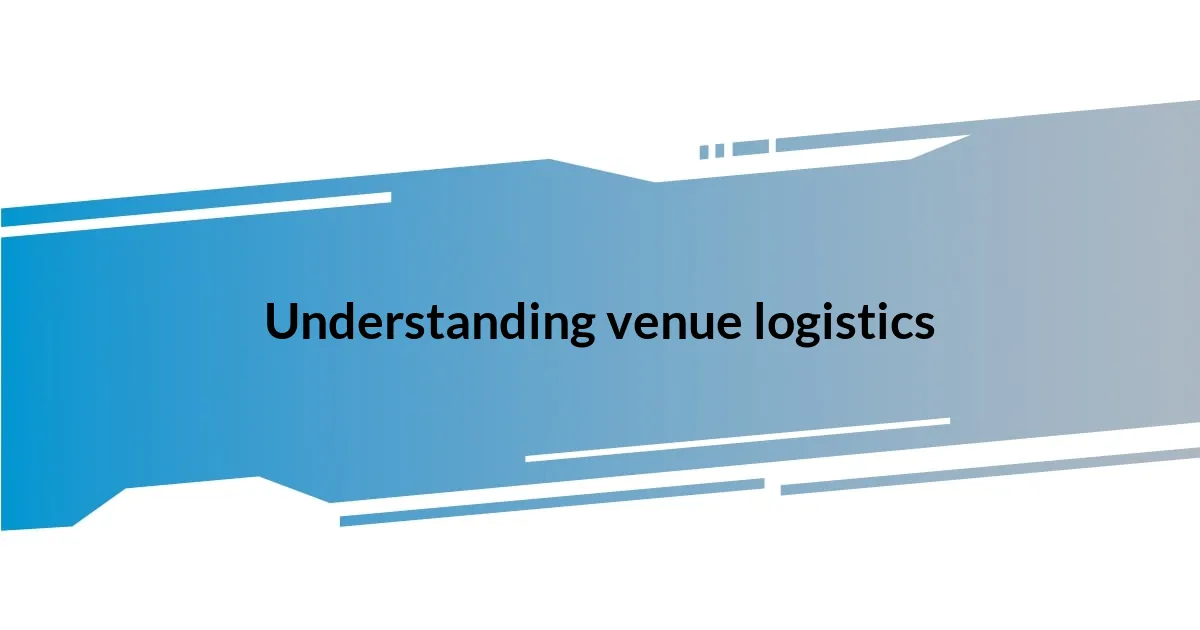
Understanding venue logistics
When I first dove into the world of venue logistics, I was amazed by how many moving pieces there really are. Have you ever noticed how the smallest details—like seating arrangements or lighting placement—can drastically impact the experience of an event? I remember one time, during a conference I was organizing, we overlooked the electrical outlet placement. That little snag almost turned into a massive headache when speakers struggled to set up their equipment.
Understanding venue logistics means grasping the logistical flow from start to finish. It’s not just about the setup but also about how attendees will navigate through the space. I vividly recall a galas where misjudged traffic patterns led to bottlenecks. Those moments taught me that planning for the guest experience is just as crucial as the event program itself.
I often think about the technology that supports venue logistics—like event management software. Have you tried using a tool that helps manage tasks and timelines? When I first experimented with such technology, it felt like I had a personal assistant by my side. It made coordination smoother and let me focus on enhancing the attendee experience rather than drowning in details.
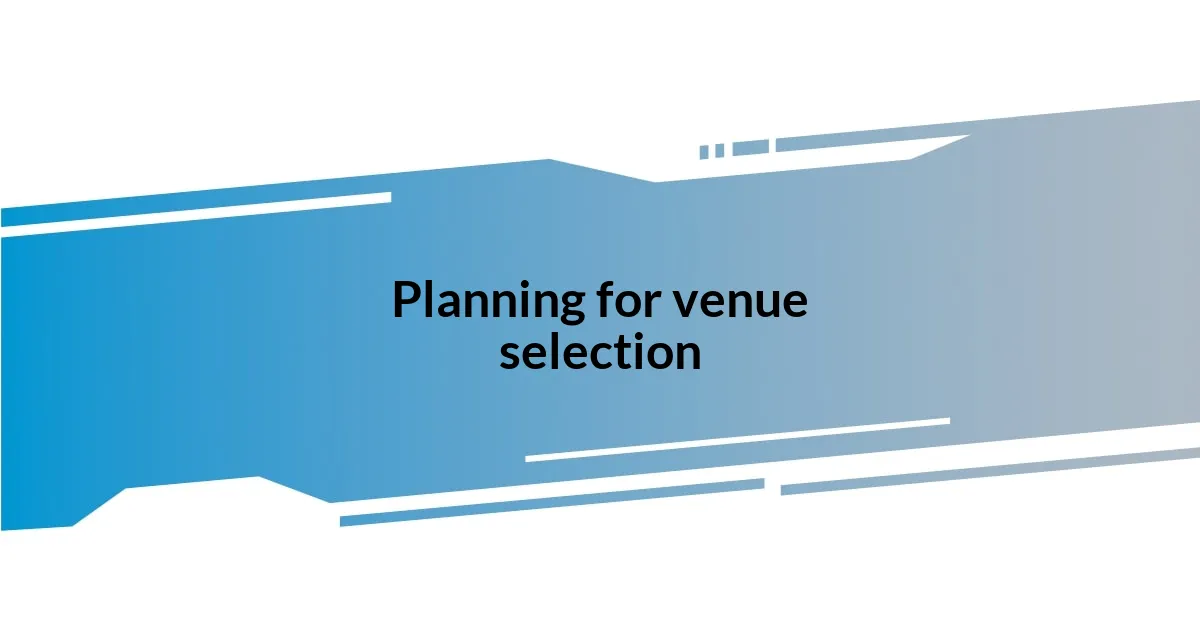
Planning for venue selection
Selecting the right venue is a crucial part of successful event planning, and my experience has taught me the importance of thorough preparations. I recall being excited about a venue that seemed perfect in pictures, only for the reality to fall short during the walkthrough. That eye-opening moment reminded me that a venue needs to not only look good but should also align with the event’s goals and audience needs.
Here are some key factors to consider when planning for venue selection:
- Capacity: Ensure the venue can comfortably accommodate all guests, leaving room for movement.
- Location: Think about accessibility for attendees, including nearby parking and public transport.
- Amenities: Evaluate what facilities are available, like audio-visual equipment and catering options.
- Ambiance: Consider the venue’s aesthetics and how they align with your event’s theme or branding.
- Cost: Establish your budget early on and factor in all potential hidden costs, such as insurance or staffing.
Every time I go through this process, I remind myself to engage emotionally with the venue. After all, it’s not just a space; it’s where memories will be created, so my heart must be as invested as my mind.
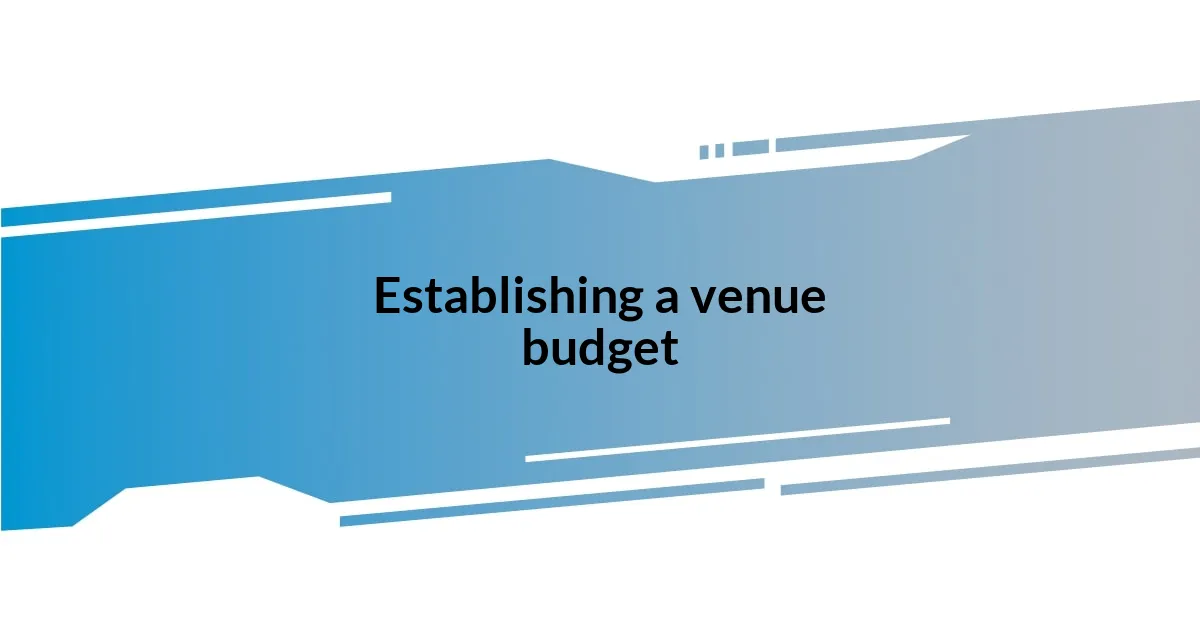
Establishing a venue budget
Establishing an effective venue budget is my secret weapon when it comes to event planning. I still remember the chaos from a charity event where I didn’t set a concrete budget upfront. The mounting costs spiraled out of control, and I found myself scrambling to cover unexpected expenses. It taught me that a well-thought-out budget isn’t just a number—it’s the backbone of planning.
As I’ve refined my budgeting skills, I learned to break down the costs into manageable categories. This has not only made the budgeting process less daunting but has also helped me identify areas where I could alleviate expenses without compromising the event quality. For instance, during one of the industry conferences, I successfully negotiated with a vendor, saving a significant amount without sacrificing the attendee experience. This proactive approach helped build my confidence in budget management.
Creating a budget isn’t just about the dollar amounts; it’s about setting a clear scope for what the event will encompass. I often create a checklist that helps me itemize every detail, from venue rental fees to decor and catering costs. This way, I can monitor my spending holistically and adjust as needed. It’s like balancing a checkbook but way more exciting because it leads to extraordinary experiences.
| Budget Item | Estimated Cost |
|---|---|
| Venue Rental | $3,000 |
| Catering | $2,500 |
| Decor | $1,000 |
| Audio-Visual Equipment | $800 |
| Staffing | $700 |
| Miscellaneous | $400 |
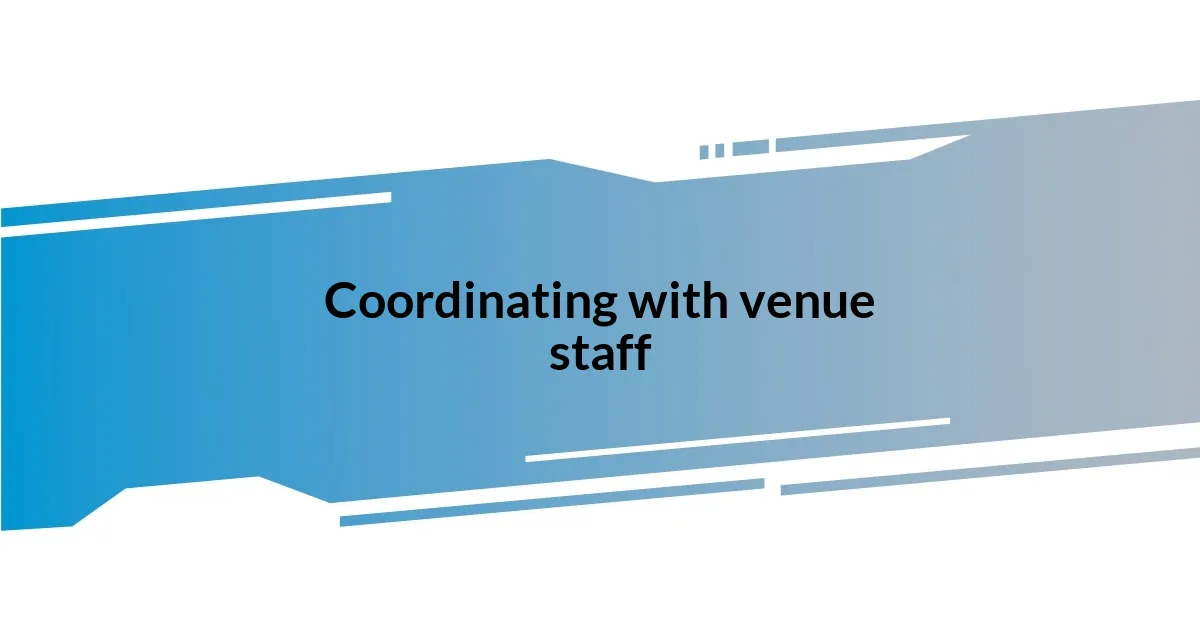
Coordinating with venue staff
Coordination with venue staff is often the unsung hero of effective event management. I remember a time when I was preparing for a large seminar. The day before the event, I met with the venue staff to discuss setups. What struck me was their intimate knowledge of the space—details I would have missed. They pointed out which walls could be moved for a better flow and made suggestions that genuinely enhanced the setup. Why wouldn’t I lean on their expertise? Their experience became an invaluable resource for ensuring everything ran smoothly.
Being proactive in communication is crucial, especially when it comes to creating a timeline. In one instance, I underestimated how critical it was to establish check-in times with the staff. On event day, I felt the tension in the air as guests began arriving early, and we weren’t ready. This hiccup taught me to prioritize detailed discussions well in advance, ensuring staff leads understood the day’s rhythm and what to expect at every turn. It’s a simple practice, but it makes a world of difference.
I’ve learned that building a rapport with venue staff can also ease potential tensions. One time, a last-minute change needed to happen due to unforeseen circumstances. Instead of panicking, my connection with the staff allowed me to collaborate on solutions quickly. As we brainstormed together, I not only felt supported, but we both left the conversation with a shared sense of purpose and enthusiasm. This experience reminds me that good collaboration isn’t just a luxury—it’s foundational to creating a successful event. How often do you think about the power of teamwork in achieving your event goals?
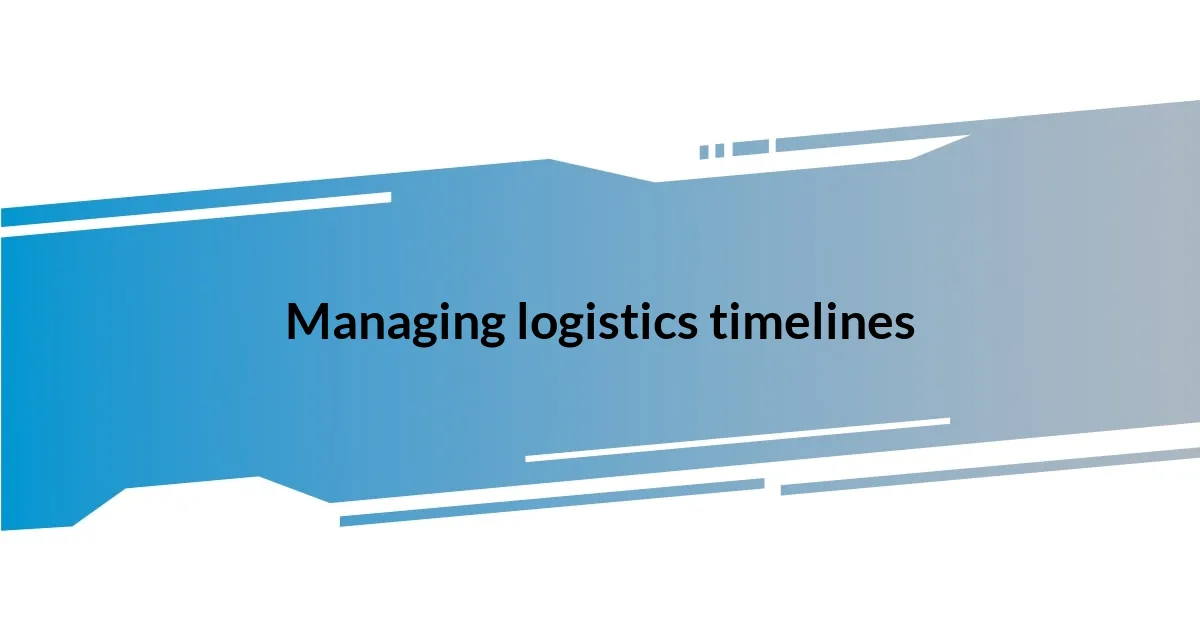
Managing logistics timelines
Managing logistics timelines can easily transform a chaotic event into a seamless experience. I vividly recall a time when I was planning a wedding; understanding the precise timing for each segment—from vendor arrivals to ceremony rehearsals—was critical. Establishing a clear timeline kept me focused and allowed me to communicate effectively with all parties involved. If you’ve ever missed a crucial moment at an event, you know just how important it is to stick to your schedule.
I like to map out a detailed timeline that includes milestones leading up to the event day. For example, leading up to a fundraising gala, I created a countdown calendar with specific tasks for each day. This approach prevented last-minute scrambling and gave everyone involved a shared sense of responsibility. Have you ever experienced that electrifying feeling when everyone is on the same page? It fosters an atmosphere of teamwork and excitement that I cherish.
Moreover, flexibility is essential in managing these timelines. I once had a caterer who showed up late due to unforeseen traffic, which caused a ripple effect on our timeline. Rather than panicking, I quickly assessed the situation and adjusted the schedule, making small shifts on the fly. It reinforced my belief that while planning is vital, adaptability is just as crucial. How do you handle unexpected hiccups when they arise? Through my experiences, I’ve learned that a little composure can turn a potential disaster into a story worth telling.
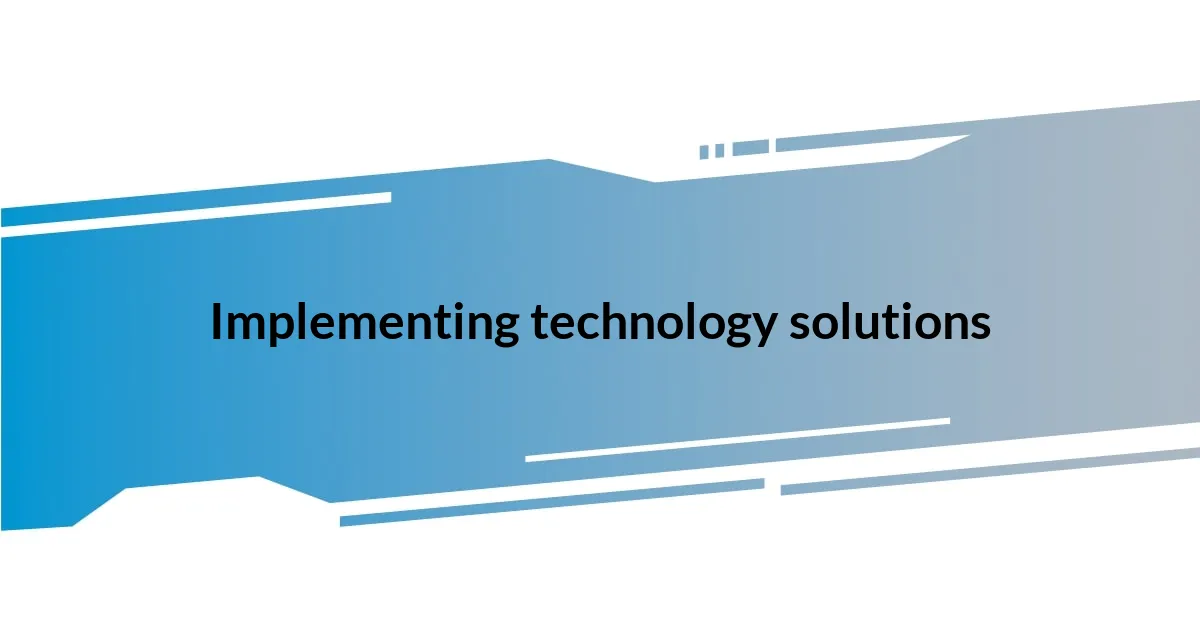
Implementing technology solutions
Implementing technology solutions can dramatically streamline venue logistics. I once integrated an event management software for a corporate retreat, and it was a game changer. With real-time updates on seating arrangements and catering needs, I was able to focus on engaging the attendees instead of getting bogged down in details. Have you ever wished for a tool that takes care of those tedious tasks so you can concentrate on what truly matters?
Using apps to coordinate with vendors also brought a new level of efficiency to my events. During a recent festival, I utilized a messaging platform that allowed me to keep everyone in the loop instantly. When one of the performers arrived late, I used the app to notify all parties about the delay, minimizing potential disruptions. It felt empowering to have clear lines of communication at my fingertips, enabling me to handle challenges swiftly. Isn’t it reassuring to know that technology can be your ally when things don’t go according to plan?
Moreover, I often rely on data analytics to inform my decisions. After collecting feedback through an event survey tool, I discovered patterns in attendee preferences that shaped my future events. For instance, understanding that guests favored interactive workshops over traditional lectures allowed me to pivot my planning strategy significantly. This insight transformed my approach and made my events more appealing and engaging. Have you tapped into data to enhance your event experiences? Through these experiences, I’ve realized that implementing technology isn’t just about convenience; it’s about reimagining what’s possible for your events.
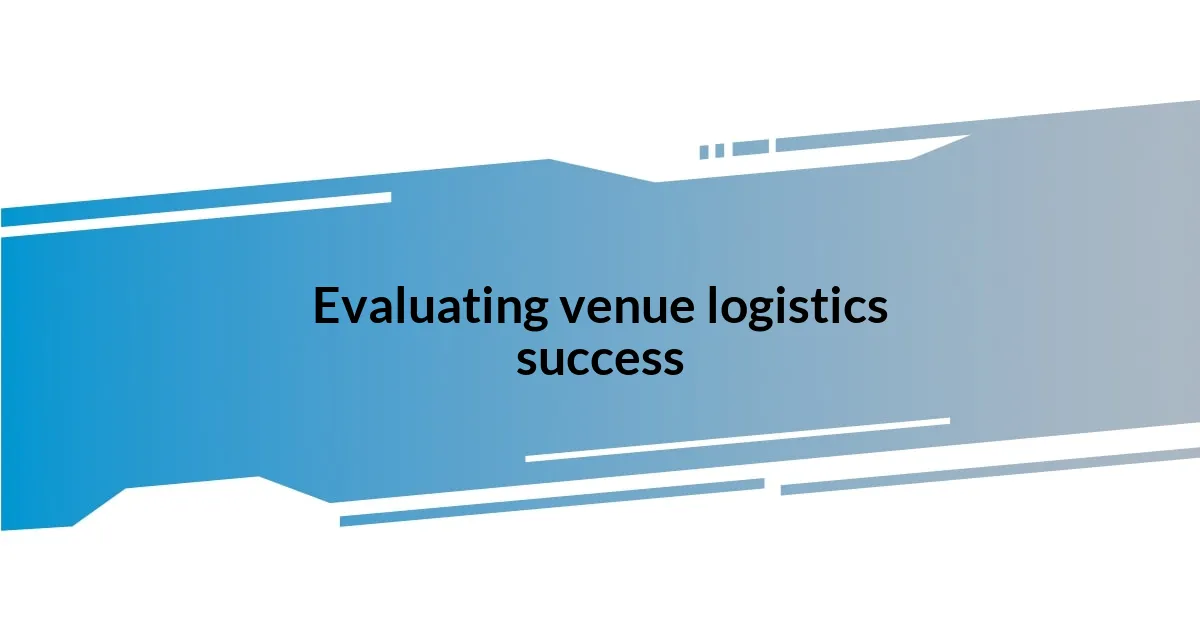
Evaluating venue logistics success
Evaluating the success of venue logistics is an insightful process that often goes beyond the event itself. I remember after a large conference, sitting down with my team to analyze every aspect—from check-in efficiency to the flow of sessions. It was illuminating to discuss what worked well and what didn’t; I found that gathering honest feedback from the attendees provided invaluable insights that often went unnoticed amid the excitement of the event.
One year, I implemented a debriefing session right after a weekend festival. We collected direct impressions from vendors and attendees on various logistical challenges. Surprisingly, the biggest takeaway was how many people experienced difficulty accessing bathrooms during peak times. It struck me that even small logistical hiccups can significantly impact the overall experience. What I learned from that evaluation was the importance of addressing these details early in the planning process. How do you ensure that attendee feedback guides your future events?
In addition to direct feedback, I also analyze logistical metrics—like the number of staff needed in each area and their response times. I once tracked the time it took to resolve issues at a trade show, and the results were eye-opening. When I looked at the data, I realized we were underprepared for peak hours, which led to longer wait times. This evaluation encouraged me to adjust staffing in future events, ensuring smoother operations and happier attendees. Isn’t it fascinating how a bit of data can drive practical changes? My experience taught me that measuring success in venue logistics encompasses both human feedback and hard metrics, creating a rounded perspective that truly enhances future planning.